- Home
- V. E. Schwab
A Darker Shade of Magic Page 21
A Darker Shade of Magic Read online
Page 21
“For hitting,” explained Lila, as if Kell couldn’t grasp the meaning of the metal knuckles. “You can stab them, or you can knock their teeth out. Or you can do both.” She touched the tip of the blade with her finger. “Not at the same time, of course.”
“Of course,” echoed Kell, shutting a cabinet. “You’re very fond of weapons.”
Lila stared at him blankly. “Who isn’t?”
“And you already have a knife,” he pointed out.
“So?” asked Lila, admiring the grip. “No such thing as too many knives.”
“You’re a violent sort.”
She wagged the blade. “We can’t all turn blood and whispers into weapons.”
Kell bristled. “I don’t whisper. And we’re not here to loot.”
“I thought that’s exactly why we’re here.”
Kell sighed and continued to look around the shop. He’d turned over the whole thing, including Fletcher’s cramped little room at the back, and come up empty. Fletcher wouldn’t have sold it … or would he? Kell closed his eyes, letting his senses wander, as if maybe he could feel the foreign magic. But the space was practically humming with power, overlapping tones that made it impossible to parse the foreign and forbidden from the merely forbidden.
“I’ve got a question,” said Lila, her pockets jingling suspiciously.
“Of course you do.” Kell sighed, opening his eyes. “And I thought I said no thieving.”
She chewed her lip and dug a few stones and a metal contraption even Kell didn’t recognize the use of out of her pocket, setting them on a chest. “You said the worlds were cut off. So how does this man—Fletcher—have a piece of White London?”
Kell sifted through a desk he swore he’d searched, then felt under the lip for hidden drawers. “Because I gave it to him.”
“Well, what were you doing with it?” Her eyes narrowed. “Did you steal it?”
Kell frowned. He had. “No.”
“Liar.”
“I didn’t take it for myself,” said Kell. “Few people in your world know about mine. Those that do—Collectors and Enthusiasts—are willing to pay a precious sum for a piece of it. A trinket. A token. In my world, most know about yours—a few people are as intrigued by your mundaneness as you are by our magic—but everyone knows about the other London. White London. And for a piece of that world, some would pay dearly.”
A wry smile cut across Lila’s mouth. “You’re a smuggler.”
“Says the pickpocket,” snapped Kell defensively.
“I know I’m a thief,” said Lila, lifting a red lin from the top of the chest and rolling it over her knuckles. “I’ve accepted that. It’s not my fault that you haven’t.” The coin vanished. Kell opened his mouth to protest, but the lin reappeared an instant later in her other palm. “I don’t understand, though. If you’re a royal—”
“I’m not—”
Lila gave him a withering look. “If you live with royals and you dine with them and you belong to them, surely you don’t want for money. Why risk it?”
Kell clenched his jaw, thinking of Rhy’s plea to stop his foolish games. “You wouldn’t understand.”
Lila quirked a brow. “Crime isn’t that complicated,” she said. “People steal because taking something gives them something. If they’re not in it for the money, they’re in it for control. The act of taking, of breaking the rules, makes them feel powerful. They’re in it for the sheer defiance.” She turned away. “Some people steal to stay alive, and some steal to feel alive. Simple as that.”
“And which are you?” asked Kell.
“I steal for freedom,” said Lila. “I suppose that’s a bit of both.” She wandered into a short hallway between two rooms. “So that’s how you came across the black rock?” she called back. “You made a deal for it?”
“No,” said Kell. “I made a mistake. One I intend to fix, if I can find the damned thing.” He slammed a drawer shut in frustration.
“Careful,” said a gruff voice in Arnesian. “You might break something.”
Kell spun to find the shop’s owner standing there, shoulder tipped against a wardrobe, looking vaguely bemused.
“Fletcher,” said Kell.
“How did you get in?” asked Fletcher.
Kell forced himself to shrug as he shot a glance toward Lila, who’d had the good sense to stay in the hallway and out of sight. “I guess your wards are wearing thin.”
Fletcher crossed his arms. “I doubt that.”
Kell stole a second glance toward Lila, but she was no longer in the hall. A spike of panic ran through him, one that worsened a moment later when she reappeared behind Fletcher. She moved with silent steps, a knife glittering in one hand.
“Tac,” said Fletcher, lifting his hand beside his head. “Your friend is very rude.” As he said it, Lila froze mid-stride. The strain showed in her face as she tried to fight the invisible force holding her in place, but it was no use. Fletcher had the rare and dangerous ability to control bones, and therefore bodies. It was an ability that had earned him the binding scars he was so proud of breaking.
Lila, for one, seemed unimpressed. She muttered some very violent things, and Fletcher splayed his fingers. Kell heard a sound like cracking ice, and Lila let out a stifled cry, the knife tumbling from her fingers.
“I thought you preferred to work alone,” said Fletcher conversationally.
“Let her go,” ordered Kell.
“Are you going to make me, Antari?”
Kell’s fingers curled into fists—the shop was warded a dozen ways, against intruders and thieves and, with Kell’s luck, anyone who meant Fletcher harm—but the shop owner himself gave a low chuckle and dropped his hand, and Lila went stumbling to her hands and knees, clutching her wrist and swearing vehemently.
“Anesh,” he said casually. “What brings you back to my humble shop?”
“I gave you something once,” said Kell. “I’d like to borrow it.”
Fletcher gave a derisive snort. “I am not in the business of borrowers.”
“I’ll buy it then.”
“And if it’s not for sale?”
Kell forced himself to smile. “You of all people know,” he said, “that everything is for sale.”
Fletcher parroted the smile, cold and dry. “I won’t sell it to you, but I might sell it to her”—his gaze glanced to Lila, who had gotten to her feet and retreated to the nearest wall to lurk and curse—“for the right price.”
“She doesn’t speak Arnesian,” said Kell. “She hasn’t the faintest idea what you’re saying.”
“Oh?” Fletcher grabbed his crotch. “I bet I can make her understand,” he said, shaking himself in her direction.
Lila’s eyes narrowed. “Burn in hell, you fu—”
“I wouldn’t bother with her,” cut in Kell. “She bites.”
Fletcher sighed and shook his head. “What kind of trouble are you in, Master Kell?”
“None.”
“You must be in some, to come here. And besides,” said Fletcher, smile sharpening. “They don’t put your face up on the boards for nothing.”
Kell’s eyes flicked to the scrying board on the wall, the one that had been painted with his face for the last hour. And then he paled. The circle at the bottom, the one that said If seen touch here was pulsing bright green.
“What have you done?” growled Kell.
Fletcher only smiled.
“No hard feelings,” he said darkly, right before the shop doors burst open, and the royal guard poured in.
V
Kell had only an instant to arrange his features, to force panic into composure, before the guards were there, five in all, filling up the room with movement and noise.
He couldn’t run—there was nowhere to run to—and he didn’t want to hurt them, and Lila … Well, he had no idea where Lila was. One moment she’d been right there against the wall, and the next she’d vanished (though Kell had seen her fingers go into the pocket of her co
at the instant before she disappeared, and he could feel the subtle hum of the stone’s magic in the air, the way Holland must have felt it at the Ruby Fields).
Kell forced himself to stay still, to feign calm, even though his heart was racing in his chest. He tried to remind himself that he wasn’t a criminal, that the royals were likely only worried by his disappearance. He hadn’t done anything wrong, not in the eyes of the crown. Not that they knew of. Unless, in his absence, Rhy had told the king and queen of his transgressions. He wouldn’t—Kell hoped he wouldn’t—but even if he had, Kell was Antari, a member of the royal family, someone to be respected, even feared. He coated himself in that knowledge as he leaned back lazily, almost arrogantly, against the table behind him.
When the members of the royal guard saw him standing there, alive and unconcerned, confusion spread across their features. Had they expected a body? A brawl? Half went to kneel, and half brought hands to rest on the hilts of their swords, and one stood there, frowning, in the middle.
“Ellis,” said Kell, nodding at the head of the royal guard.
“Master Kell,” said Ellis, stepping forward. “Are you well?”
“Of course.”
Ellis fidgeted. “We’ve been worried about you. The whole palace has been.”
“I didn’t mean to worry anyone,” he said, considering the guard around him. “As you can see, I’m perfectly all right.”
Ellis looked around, then back at Kell. “It’s just … sir … when you did not return from your errand abroad…”
“I was delayed,” said Kell, hoping that would quell the questions.
Ellis frowned. “Did you not see the signs? They’re posted everywhere.”
“I only just returned.”
“Then, forgive me,” countered Ellis, gesturing to the shop. “But what are you doing here?”
Fletcher frowned. Though he spoke only Arnesian, he clearly understood the royal tongue well enough to know he was being insulted.
Kell forced a thin smile. “Shopping for Rhy’s present.”
A nervous laugh passed through the guard.
“You’ll come with us, then?” asked Ellis, and Kell understood the words that went unsaid. Without a fight.
“Of course,” said Kell, rising to his full height and smoothing his jacket.
The guards looked relieved. Kell’s mind spun as he turned to Fletcher and thanked him for his help.
“Mas marist,” answered the shop’s owner darkly. My pleasure. “Just doing my civic duty.”
“I’ll be back,” said Kell in English (which garnered a raised brow from the royal guard), “as soon as I am through. To find what I was looking for.” The words were directed at Lila. He could still feel her in the room, feel the stone even as it hid her. It whispered to him.
“Sir,” said Ellis, gesturing to the door. “After you.”
Kell nodded and followed him out.
* * *
The moment she heard the guards burst in, Lila had the good sense to close her hand over the stone and say “Conceal me.”
And the stone had obeyed once more.
She’d felt a flutter up her arm, just beneath her skin, a lovely sensation—had it felt that nice the last time she’d used the talisman?—and then the veil had settled over her again and she was gone. Just as before, she could see herself, but no one else could see her. Not the guards, not Fletcher, not even Kell, whose two-toned eyes leveled on her but seemed to make out only the place she’d been, and not the place she was.
But though he could not see her, she could see him, and in his face she read a flicker of worry, disguised by his voice but not his posture, and under it a warning, threaded through the false calm of his words.
Stay, it seemed to urge, even before he said the words, lobbed at the room but clearly meant for her. So she stayed and waited and watched as Kell and four of the five members of the guard poured out into the street. Watched as a single guard hung back, his face hidden beneath the lowered visor of his helmet.
Fletcher was saying something to him, gesturing at his palm in the universal sign for payment. The guard nodded, and his hand went to his belt as Fletcher turned to watch Kell through the window.
Lila saw it coming.
Fletcher never did.
Instead of reaching for a purse, the guard went for a blade. The metal glinted once in the shop’s low light, and then it was under Fletcher’s chin, drawing a silent red line across his throat.
* * *
A closed carriage, pulled by royal white horses, gold and red ribbons still woven through their manes from the earlier parade, was waiting for Kell in front of the shop.
As Kell made his way to it, he shrugged out of his coat and turned it left to right, sliding his arms back into the now-red sleeves of his royal attire. His thoughts spun over what to tell the king and queen—not the truth, of course. But the king himself had a White London token, an ornament that sat on a shelf in his private chamber, and if Kell could get it, and get back to Lila and the stone … Lila and the stone loose in the city—it was a troubling thought. But hopefully she would stay put, just a little while. Stay out of trouble.
Ellis walked a half step behind Kell, three more guards trailing in his wake. The last had stayed behind to talk to Fletcher, and most likely settle the matter of the reward (though Kell was fairly sure Fletcher hated him enough to turn him in even without the added prospect of money).
Down the river toward the palace, the day’s celebrations were dying down—no, not dying, shifting—to make way for the evening’s festivities. The music had softened, and the crowds along the docks and up the market stretch had thinned, migrating to the city’s various pubs and inns to continue toasting Rhy’s name.
“Come, sir,” said Ellis, holding the carriage door open for him. Instead of seats that faced each other, this carriage had two sets of benches both facing forward; two of the guards took the seat behind, and one went up to sit with the driver, while Ellis slid onto the front bench beside Kell and pulled the carriage door closed. “Let’s get you home.”
Kell’s chest ached at the thought of it. He had tried not to let himself think of home, of how badly he wanted to be there, not since the stone—and the grim task of its disposal—had fallen to him. Now all he wanted was to see Rhy, to embrace him one last time, and he was secretly glad of the chance.
He let out a shaky breath and sank back onto the bench as Ellis drew the carriage curtains.
“I’m sorry about this, sir,” he said, and Kell was about to ask what for when a hand clamped a cloth over his mouth, and his lungs filled with something bitter and sweet. He tried to wrench free, but armored gloves closed over his wrists and held him back against the bench, and within moments, everything went dark.
* * *
Lila sucked in a breath, unheard beneath the veil, as the guard let go of Fletcher’s shoulder and he fell forward, thudding in a lifeless mass against the worn floorboards of the shop.
The guard stood there, unfazed by the murder and seemingly oblivious to the fact he was now splattered with someone else’s blood. He surveyed the room, his gaze drifting past her, but through the slot in his helmet, Lila thought she saw an odd shimmer in his eyes. Something like magic. Satisfied that there was no one else to dispose of, the guard returned his blade to its sheath, turned on his heel, and left the shop. A dull bell followed him out, and a few moments later, Lila heard a carriage shudder to life and rumble away down the street.
Fletcher’s body lay sprawled on the floor of his shop, blood soaking through his wiry blond hair and staining the boards beneath his chest. His smug expression was gone, replaced by surprise, the emotion preserved by death like an insect in amber. His eyes were open and empty, but something pale had tumbled from his shirt pocket and was now caught between his body and the floor.
Something that looked very much like a white rook.
Lila looked around to make sure she was alone, then did away with the concealment spell. It wa
s easy enough, undoing the magic, but letting go of the stone itself proved considerably more difficult; it took her a long moment, and when she finally managed to pull free and drop the talisman back into her pocket, the whole room tilted. A shudder passed through her, stealing warmth and something more. In the magic’s wake, she felt … empty. Lila was used to hunger, but the stone left her feeling starved in a bone-deep way. Hollow.
Bloody rock, she thought, tucking the toe of her boot under Fletcher’s dead shoulder and turning him over, his blank stare now directed up at the ceiling, and at her.
She knelt, careful to avoid the spreading red slick as she picked up the blood-flecked chess piece.
Lila swore with relief and straightened, weighing it appraisingly. At first glance, it looked rather ordinary, and yet, when she curled her fingers around the stone—or bone, or whatever it was carved out of—she could almost feel the difference between its energy and that of the London around her. It was subtle, and perhaps she was imagining it, but the rook felt like a draft in a warm room. Just cold enough to seem out of place.
She shrugged off the sensation and tucked the chess piece into her boot (she didn’t know how magic worked, but it didn’t seem a wise idea to keep the two talismans close together, not until they were needed, and she wasn’t touching the thieving little rock again unless she absolutely had to). She wiped Fletcher’s blood off on her pants.
All things considered, Lila was feeling rather accomplished. After all, she had the Black London stone and the White London token. Now all she needed was Kell.
Lila turned toward the door and hesitated. He’d told her to stay put, but as she looked down at Fletcher’s fresh corpse, she feared he’d walked into trouble of his own. She’d been in Red London only a day, but it didn’t seem like the place where royal guards went around slitting people’s throats. Maybe Kell would be fine. But if he wasn’t?
Her gut said to go, and years of stealing to survive had taught her to listen when it spoke. Besides, she reasoned, no one in the city was looking for her.
Lila made for the door, and she was almost to it when she saw the knife again, the one she’d been so keen on, sitting on top of the chest where she’d left it. Kell had warned her against thieving in the shop, but the owner was dead and it was just sitting there, unappreciated. She took it up and ran a finger gingerly along the blade. It really was a lovely knife. She eyed the door, wondering if the wards protecting the shop from thieves had died with their maker. Might as well test it. Carefully, she opened the door, set the weapon on the floor, and used the toe of her boot to kick the knife over the threshold. She cringed, waiting for the backlash—a current of energy, a wave of pain, or even the knife’s stubborn return shop-side—but none came.

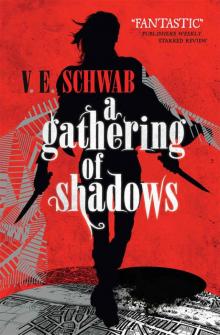 A Gathering of Shadows
A Gathering of Shadows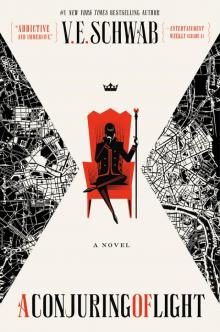 A Conjuring of Light
A Conjuring of Light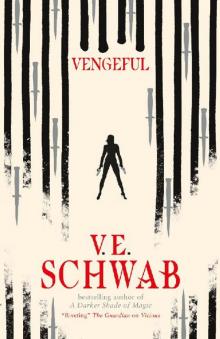 Vengeful
Vengeful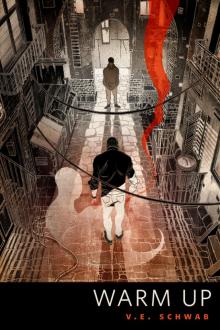 Warm Up
Warm Up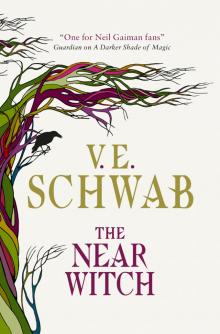 The Near Witch
The Near Witch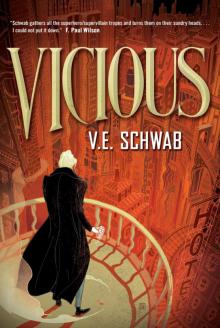 Vicious
Vicious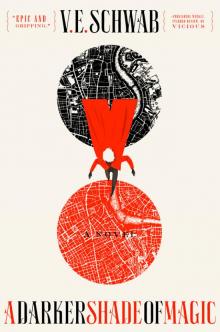 A Darker Shade of Magic
A Darker Shade of Magic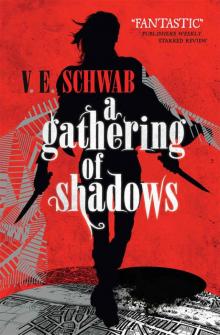 Gathering of Shadows (A Darker Shade of Magic)
Gathering of Shadows (A Darker Shade of Magic)